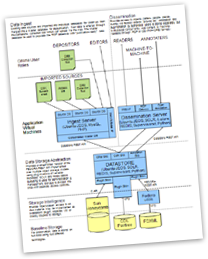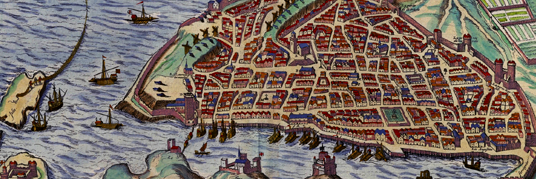* You are viewing the archive for August, 2010
 Neil Jefferies, who oversees the technical attributes of our union catalogue, will be presenting on the digital components of the Project next month at a conference entitled Digital Library: Digitising and Accessing Content (Slovakia, 22-24 September 2010). The event will bring together libraries from across Europe to share technologies, best practices, and emerging global standards in the field of large data sets and metadata preservation in the cultural and heritage sectors. Neil, who will also be delivering a keynote lecture at the conference, will be describing the catalogue’s innovative system architecture and its relationship to the Digital Asset Management System, which has been developed as a platform to support digital library projects within Oxford. Further details are available on the conference website.
Neil Jefferies, who oversees the technical attributes of our union catalogue, will be presenting on the digital components of the Project next month at a conference entitled Digital Library: Digitising and Accessing Content (Slovakia, 22-24 September 2010). The event will bring together libraries from across Europe to share technologies, best practices, and emerging global standards in the field of large data sets and metadata preservation in the cultural and heritage sectors. Neil, who will also be delivering a keynote lecture at the conference, will be describing the catalogue’s innovative system architecture and its relationship to the Digital Asset Management System, which has been developed as a platform to support digital library projects within Oxford. Further details are available on the conference website.
 We are currently seeking a Postdoctoral Fellow, fluent in both Czech and English, to work on the correspondence of the pioneering Moravian educational theorist Jan Amos Comenius (1592-1670). The successful candidate (who will be employed by and based at the Department for the Study and Editing of Comenius’s Work at the Institute of Philosophy of the Czech Academy of Sciences in Prague) will continue the compilation, translation, and correction of a database and digital archive of Comenius’s complete correspondence, which will form a central component of the Project’s union catalogue. The deadline for applications is noon on Wednesday 15 September 2010; further details and application instructions are available in English on our vacancies page and in Czech on the website of the Institute of Philosophy.
We are currently seeking a Postdoctoral Fellow, fluent in both Czech and English, to work on the correspondence of the pioneering Moravian educational theorist Jan Amos Comenius (1592-1670). The successful candidate (who will be employed by and based at the Department for the Study and Editing of Comenius’s Work at the Institute of Philosophy of the Czech Academy of Sciences in Prague) will continue the compilation, translation, and correction of a database and digital archive of Comenius’s complete correspondence, which will form a central component of the Project’s union catalogue. The deadline for applications is noon on Wednesday 15 September 2010; further details and application instructions are available in English on our vacancies page and in Czech on the website of the Institute of Philosophy.

Marseille in 1575. View sourced from Historic Cities.
In the eighth and final installment of the Project’s inaugural seminar series on Wednesday 23 June, held in conjunction with the conference John Selden (1584–1654): Scholarship in Context, Professor Peter Miller (Bard Graduate Center) delivered a wide-ranging overview of ‘Peiresc’s Mediterranean Merchant Network’. Focusing on the letters sent by the polymath from Marseille in the early seventeenth century, Miller elaborated a fascinating story of ‘Peiresc and the sea’ in four parts (which focused respectively on Marseille, space and time in the Mediterranean, merchants, and names). The small, fast nature of Marseillaise ships, especially compared to Venetian craft, meant that letters dispatched from the French port arrived at their destinations quickly (reaching Leiden, for example in fifteen days), and Peiresc’s epistolary activities in the Mediterranean were reliant on an extensive maritime network of non-elite merchants, captains, and sailors, whose identities are in many cases painstakingly recorded (along with other names and biographies) in the letters themselves. This means that it is possible to reconstruct this particular correspondence ‘cloud’ (in Miller’s phrase) in particular detail, and during discussion he provided us with a tantalising glimpse into his forthcoming digitisation initiative which will both visualise Peiresc’s Mediterranean network and link it in an innovative way to an online monograph. For past lectures in the series, please see the seminar webpage; details of the 2011 series will be available shortly.
 Neil Jefferies, who oversees the technical attributes of our union catalogue, will be presenting on the digital components of the Project next month at a conference entitled Digital Library: Digitising and Accessing Content (Slovakia, 22-24 September 2010). The event will bring together libraries from across Europe to share technologies, best practices, and emerging global standards in the field of large data sets and metadata preservation in the cultural and heritage sectors. Neil, who will also be delivering a keynote lecture at the conference, will be describing the catalogue’s innovative system architecture and its relationship to the Digital Asset Management System, which has been developed as a platform to support digital library projects within Oxford. Further details are available on the conference website.
Neil Jefferies, who oversees the technical attributes of our union catalogue, will be presenting on the digital components of the Project next month at a conference entitled Digital Library: Digitising and Accessing Content (Slovakia, 22-24 September 2010). The event will bring together libraries from across Europe to share technologies, best practices, and emerging global standards in the field of large data sets and metadata preservation in the cultural and heritage sectors. Neil, who will also be delivering a keynote lecture at the conference, will be describing the catalogue’s innovative system architecture and its relationship to the Digital Asset Management System, which has been developed as a platform to support digital library projects within Oxford. Further details are available on the conference website.
 We are currently seeking a Postdoctoral Fellow, fluent in both Czech and English, to work on the correspondence of the pioneering Moravian educational theorist
We are currently seeking a Postdoctoral Fellow, fluent in both Czech and English, to work on the correspondence of the pioneering Moravian educational theorist 

 Join
Join 